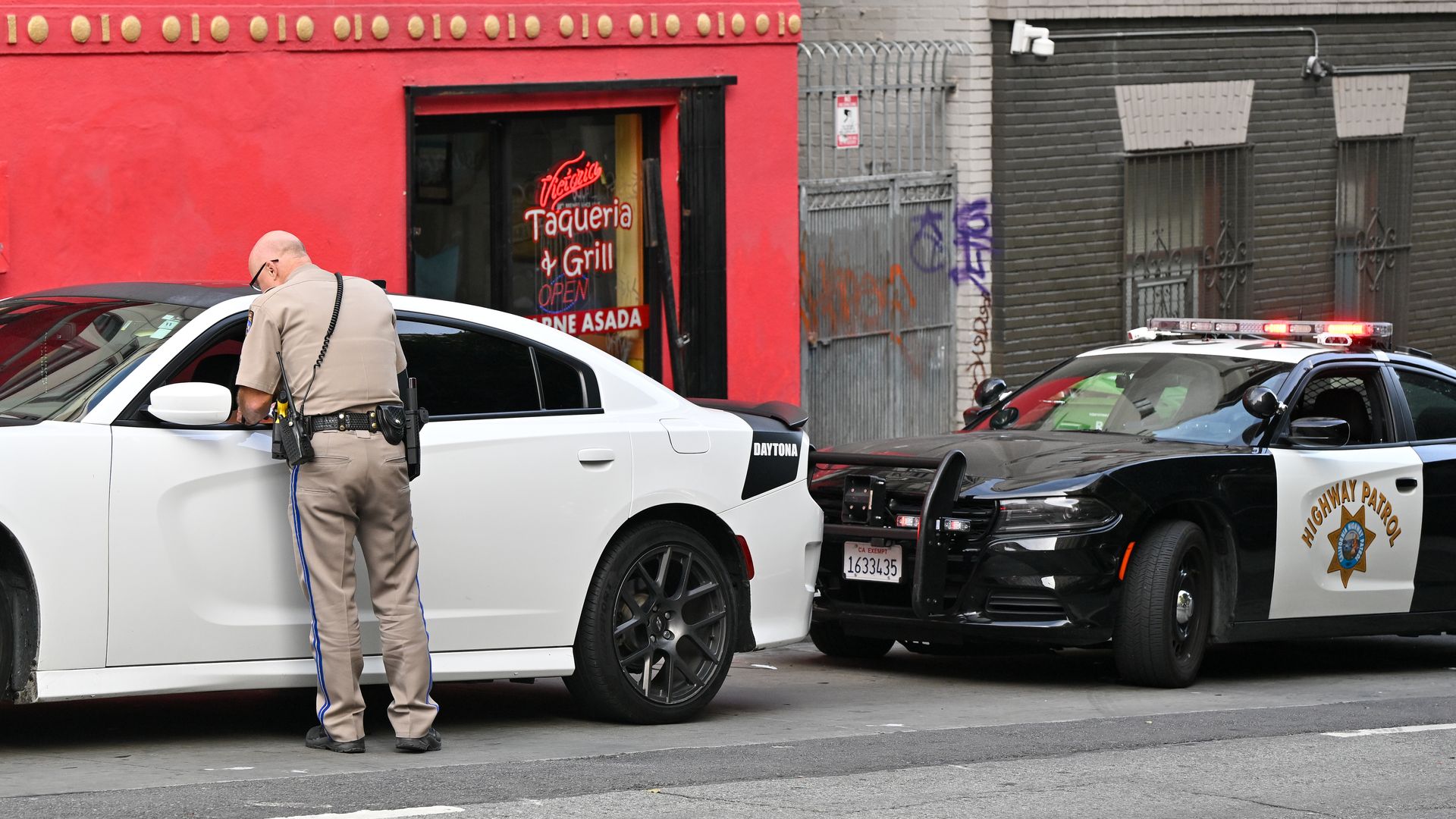
California police will soon have to tell drivers exactly why they were pulled over
Media Landscape
See how news outlets across the political spectrum are covering this story. Learn moreLiar Liar – UNIVERSAL PICTURES: “You know why I pulled you over?”
Lauren Taylor: IT’S A QUESTION NO ONE WANTS TO HEAR ON THEIR COMMUTE… AND STARTING MONDAY… DRIVERS IN CALIFORNIA WON’T HAVE TO HEAR IT IF THEY GET PULLED OVER ANYMORE…
A BILL SIGNED INTO LAW BY GOVERNOR GAVIN NEWSOM IN 20-22 IS SET TO GO INTO EFFECT JANUARY 1ST.
THE NEW LAW REQUIRES POLICE OFFICERS TO GIVE THE REASON FOR STOPPING A DRIVER BEFORE QUESTIONING THEM. UNLESS* QUOTE:
“THE OFFICER REASONABLY BELIEVES THAT WITHHOLDING THE REASON FOR THE STOP IS NECESSARY TO PROTECT LIFE OR PROPERTY FROM IMMINENT THREAT.”
SUPPORTERS OF THE BILL SAY IT AIMS TO REDUCE RACIAL PROFILING AND PRE-TEXTUAL STOPS WHICH ALLOW POLICE TO STOP SOMEONE FOR SOMETHING MINOR, THEN SEARCH THEM OR THEIR VEHICLE FOR EVIDENCE OF A LARGER CRIME.
WHILE NOTING THAT RACIAL PROFILING – IS ILLEGAL – IT STILL SOMETIMES HAPPENS.
DURING A HEARING IN 20-22, ASSEMBLYMEMBER CHRIS HOLDEN – WHO AUTHORED THE BILL SAID:
“I BELIEVE THAT THE CONFRONTATION BETWEEN THE LAW ENFORCEMENT AND THE PUBLIC BEGINS BECAUSE PEOPLE OF COLOR ARE BEING ASKED TO SURRENDER THEIR CIVIL RIGHTS AND THEY DO NOT EVEN KNOW WHY THEY ARE BEING STOPPED. BUT THEY ARE FORCED TO COMPLY.”
THE HOPE IS – THIS POLICING ADJUSTMENT WILL OPEN LINES OF COMMUNICATION AND DE-ESCELATE INTERACTIONS – BETWEEN OFFICERS AND CIVILIANS.
20-21 DATA FROM THE PUBLIC POLICY INSTITUTE OF CALIFORNIA SHOWS BLACK CALIFORNIANS WERE TWICE AS LIKELY TO BE SEARCHED DURING A TRAFFIC STOP THAN WHITE CALIFORNIANS.
WHILE THE CALIFORNIA SHERIFF’S ASSOCIATION CALLED THE LAW “STRICT” – ARGUING AGAINST THE BILL IN 20-22 – THE GROUP SAID SEEKING MORE INFORMATION AT THE BEGINNING OF TRAFFIC STOPS IS VITAL IN ASSESSING RISK SAYING QUOTE..
“TRAFFIC STOPS CAN BE AMONG THE MOST DANGEROUS TYPES OF INTERACTIONS THAT PEACE OFFICERS ENCOUNTER AND IT OFTEN MAKES SENSE FOR AN OFFICER TO SEEK AND OBTAIN ADDITIONAL INFORMATION AT THE VERY BEGINNING OF A CONTACT.”
THE SACRAMENTO POLICE DEPARTMENT TOLD A LOCAL NEWS AFFILIATE THAT THE DEPARTMENT HAS BEEN TRAINING ITS OFFICERS AND CADETS IN THIS PRACTICE FOR YEARS TO HELP PROVIDE “GREAT CUSTOMER SERVICE” TO THE PEOPLE IT SERVES.
POLICE REFORM HAS BECOME A CONTENTIOUS POLITICAL DEBATE IN CITY HALLS AND STATE LEGISLATURE CHAMBERS AS STATES ACROSS THE COUNTRY WRESTLE WITH WHAT THAT SHOULD LOOK LIKE.
THIS MONTH CITY COUNCIL IN EL PASO, TEXAS INTRODUCED A POTENTIAL CHANGE – THAT WOULD REQUIRE POLICE TO ASK FOR AND USE A PERSON’S PREFERRED NAME, PRONOUNS, AND GENDER IDENTITY.
THE GOAL BEING TO IMPROVE POLICE INTERACTIONS WITH PEOPLE IN THE L-B-G-T-Q PLUS COMMUNITY. THAT CHANGE IS SCHEDULED FOR A VOTE IN JANUARY.









